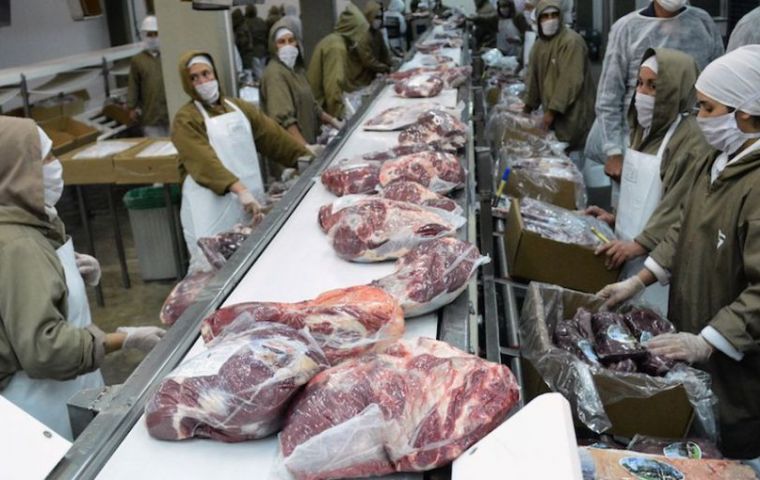MercoPress. South Atlantic News Agency
Bolivia bans beef exports to guarantee domestic supply
 Bolivia's domestic beef market needs to be adequately supplied before any surplus can be sold abroad, Gonzales said.
Bolivia's domestic beef market needs to be adequately supplied before any surplus can be sold abroad, Gonzales said. The Government of Bolivia Thursday decided to halt all beef exports to prevent international demand from leading to an increase in price domestic consumers could not afford, Minister of Rural Development and Lands, Remmy Gonzales announced. “We have already talked with the sectors and we have already taken the measures to suspend exports while the domestic market is not supplied,” he told the media.
Gonzales explained that a joint resolution was issued between the Ministries of Rural Development and Lands and Productive Development and Plural Economy to guarantee supply domestically before any surplus can be sold abroad.
The measure was announced in coincidence with the Santa Cruz retailers' decision to go on strike between April 23 and 27 as a result of an alleged increase in the price by the producers, who in turn, voiced their fears of uncertainty in light of the restrictions imposed by the authorities.
Meanwhile, the National Confederation of Meat Workers of Bolivia (Contracabol) had announced a strike for April 26 and 27 to demand the repeal of Supreme Decree 2489 of 2015, which establishes the expansion of the export quota of beef by 7,000 additional tons.
Due to the validity of this norm, leaders denounced that contraband is generated in Brazil and Peru, where it is being marketed at “much higher” prices compared to what is happening in the Bolivian market.
In Gonzales' opinion, the situation will gradually be regulated and the Contracabol leadership would no longer have reasons to activate mobilizations. “The meat does not come out as long as food security is not guaranteed,” he reiterated.
The governor-elect of Santa Cruz, Luis Fernando Camacho, questioned the government's determination since he considered that it will affect the development of the livestock sector, mainly in the eastern Bolivian region. “The government of [President] Luis Arce made a serious decision against the livestock sector by prohibiting the export of beef. It is a mistake that will affect the future development of the sector and its growth, at a time when we need to reactivate the economy and generate employment (sic),” Camacho posted on Twitter.
According to retailers, beef exports were one of the reasons for the increase in the price which rose from 17 to 23 Bolivians in the last quarter. Faced with this situation, they demanded that the Government repeals Supreme Decree 2489 that authorizes the export of surplus beef production.
Eastern Agricultural Chamber (CAO) leader Óscar Mario Justiniano said he believed the government's decision, despite its temporary nature, does not accompany economic reactivation and generates uncertainty to the investor. “Of course they are negative signals, they are wrong signals, even if they are temporary suspensions,” Justiniano said.
Through another Supreme Decree, the Arce administration has set a cap of US $ 20,000 to the circulation of foreign currency in cash through the borders, while any amount above that limit should be channelled through the banking system. The measure follows the recommendation of the Financial Action Task Force (FATF), which states that “countries must implement a declaration system or a disclosure system for the cross-border, inbound and outbound transportation of currency.” The previous limit was set at USD 50,000.




Top Comments
Disclaimer & comment rulesCommenting for this story is now closed.
If you have a Facebook account, become a fan and comment on our Facebook Page!